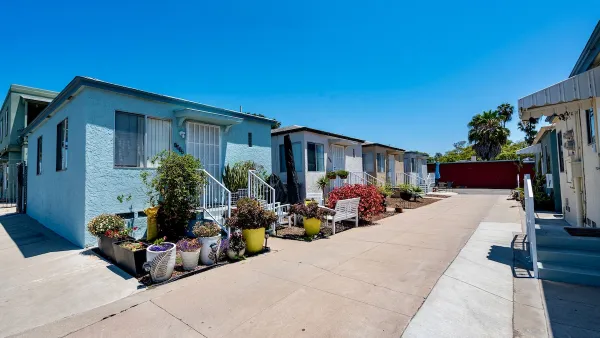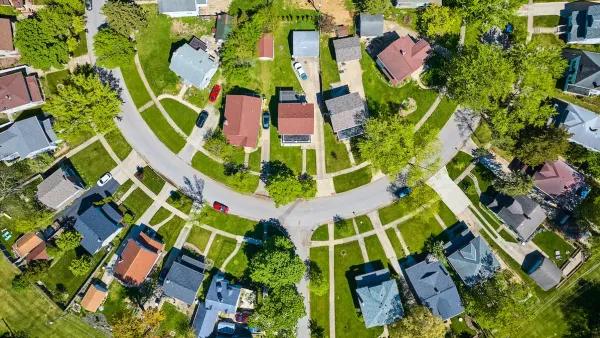This week, the Economist’s cover story, "The trouble with the housing market," details the downward-spiraling "subprime" mortgage market and its potential effects on the U.S. economy. The collapsing market certainly poses problems to Wall Street traders and taxpayers in general, but what about the physical toll it's taking on our cities? Abandoned, foreclosed homes now increasingly dot the nation's inner ring suburbs, helping spread neighborhood decline out from inner cities, while developers build more homes farther into the urban periphery.
This week, the Economist's cover story, "The trouble with the housing market," details the downward-spiraling "subprime" mortgage market and its potential effects on the U.S. economy. The collapsing market certainly poses problems to Wall Street traders and taxpayers in general, but what about the physical toll it's taking on our cities? Abandoned, foreclosed homes now increasingly dot the nation's inner ring suburbs, helping spread neighborhood decline out from inner cities, while developers build more homes farther into the urban periphery.
After a long history of redlining (denying loans to poorer people due to perceived greater risks), banks, spurred in part by the Community Reinvestment Act of 1977, began to make more of these "subprime" loans to people with little savings or poor credit histories, albeit conservatively. As the housing market heated up, however, more banks and other "financial services" companies got in on the action, sometimes making predatory loans with low initial interest and little money down to families dreaming of homeownership. Many innocent investors unwittingly buried themselves in debt, and some found themselves homeless, as deal terms initially glossed over by lenders turned into huge interest rates, leading to foreclosures (see for example this foreclosure blog referenced in the Economist).
The New York Times has been tracking the phenomenon, and a recent story detailed the startling impact of home foreclosures on suburban Cleveland. In Cuyahoga County, the rate of foreclosures went from 2,500 in 1995 to 15,000 in 2006. One county official estimates that 10,000 of the city's 84,000 single-family homes are abandoned. The county has actually taken to maintaining the empty houses - mowing the lawns, installing security systems - to discourage vandalism and prevent drug havens from forming as the area approaches the tipping point toward decline.
Meanwhile, the accounting scandal at Fannie Mae, the largest mortgage lender in the country, has recently trickled down to its charitable organization, the Fannie Mae Foundation, which on February 23 announced that it will close by the end of April. Over the past 25-plus years, in addition to granting tens of millions of dollars to housing-related initiatives - including its ubiquitous mortgage education program - the foundation sponsored the academic journal Housing Policy Debate, one of the preeminent publications in the field of affordable housing. Now back issues have been taken down from the foundation website, and the future of both the journal and the mortgage education programs is highly uncertain.
So, while politicians from both parties continue to tout the doctrine of homeownership - what might be considered the only consistent and unified "urban policy" of the federal government - more lending institutions are duping Americans into buying homes on unstable terms. The demand for single-family homes pulls more families farther and farther into sprawling urban regions, emptying out inner cities, and now, more often, inner suburbs - traditionally due to greater land availability, and now caused in part by foreclosures. While homeownership is a worthy goal, theoretically increasing owners' stake in their communities while providing financial security, Congress needs to crack down on predatory lending (some efforts are being made) while supporting continued education and scholarship about affordable housing, which has taken a hit with the Fannie Mae Foundation's closure. And instead of myopically focusing on homeownership, HUD and the White House should take a more holistic approach to urban planning, increasing funding to successful, broader programs like the Community Development Block Grant, instead of letting the private housing market dictate the shape of our nation's cities and suburbs.

Maui's Vacation Rental Debate Turns Ugly
Verbal attacks, misinformation campaigns and fistfights plague a high-stakes debate to convert thousands of vacation rentals into long-term housing.

Planetizen Federal Action Tracker
A weekly monitor of how Trump’s orders and actions are impacting planners and planning in America.

San Francisco Suspends Traffic Calming Amidst Record Deaths
Citing “a challenging fiscal landscape,” the city will cease the program on the heels of 42 traffic deaths, including 24 pedestrians.

Defunct Pittsburgh Power Plant to Become Residential Tower
A decommissioned steam heat plant will be redeveloped into almost 100 affordable housing units.

Trump Prompts Restructuring of Transportation Research Board in “Unprecedented Overreach”
The TRB has eliminated more than half of its committees including those focused on climate, equity, and cities.

Amtrak Rolls Out New Orleans to Alabama “Mardi Gras” Train
The new service will operate morning and evening departures between Mobile and New Orleans.
Urban Design for Planners 1: Software Tools
This six-course series explores essential urban design concepts using open source software and equips planners with the tools they need to participate fully in the urban design process.
Planning for Universal Design
Learn the tools for implementing Universal Design in planning regulations.
Heyer Gruel & Associates PA
JM Goldson LLC
Custer County Colorado
City of Camden Redevelopment Agency
City of Astoria
Transportation Research & Education Center (TREC) at Portland State University
Jefferson Parish Government
Camden Redevelopment Agency
City of Claremont





























